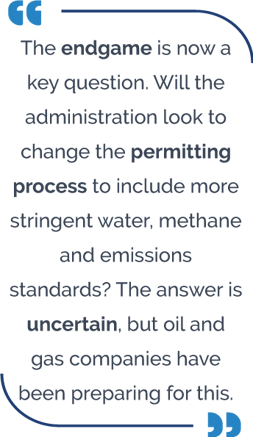President Biden has quickly begun executing on his policy agenda. In his first ten days in office, he announced the United States will rejoin the Paris Agreement and announced a sweeping climate plan. He appeared to come down hard on the oil and gas industry in the US. But did he? President Biden’s administration cancelled the presidential permit for the Keystone XL pipeline, ordered a cessation of leases in the Arctic National Wildlife Refuge (ANWR), directed federal agencies to eliminate fossil fuel subsidies and temporarily suspended new fossil-fuel-related leases and permits on federal land. President Biden had telegraphed these moves during his campaign, so they did not come as a surprise to me or the market.
The administration’s first moves support the base case I laid out before the election, and I believe they will have fairly limited near-term impact on oil and gas producers and production. Here’s why:
- Cancellation of the Keystone XL pipeline permit: Local challenges had held up the pipeline throughout the Trump administration, rendering the cancellation largely symbolic.
- Cessation of leases in the ANWR: The federal government just completed the first round of leases in the area, which was met with poor demand. The leases failed to garner interest from major and independent oil companies largely due to the difficult operating environment, lack of capital for new exploration spending anticipated permitting challenges, and ESG (environmental, social and governance) concerns.
- Elimination of fossil fuel subsidies: On the face of it, this move would free up funds that could be reinvested into renewable energy initiatives. However, it requires Congressional approval—no easy feat with a narrow Democratic majority in the Senate. Further, many oil companies have significant net operating losses that would prevent them from paying cash taxes, even if the federal government eliminates the intangible drilling costs credit.
- Cessation of lease activity: Over the near term, the cessation of leases will have a minimal impact on production and producers as the majority of high-quality federal onshore acreage has already been leased to producers. In the offshore arena, recent lease rounds have seen tepid interest as major and independent producers have shunned offshore development and many of the remaining companies have stressed balance sheets. As a result, I see a limited near-term impact from this move.
- Sixty-day suspension of permits on federal land: The suspension will last for 60 days while the administration reviews existing fossil-fuel related permitting practices. Drilling can continue on federal onshore and offshore land as oil and gas companies already have ample inventory of drilling permits onshore and permits were already included in the lease for currently leased offshore acreage.
What’s the endgame?
 The endgame is now a key question. Will the administration look to change the permitting process to include more stringent water, methane and emissions standards? Or will Biden try to balance the demands from environmental groups and the economic impacts of a carbon clampdown?
The endgame is now a key question. Will the administration look to change the permitting process to include more stringent water, methane and emissions standards? Or will Biden try to balance the demands from environmental groups and the economic impacts of a carbon clampdown?
The answer is uncertain, but oil and gas companies have been preparing for this. Onshore producers listened to President Biden’s campaign pledges and began stockpiling drilling permits in 2020. As a result, companies with significant acreage on federal land have several years of permit inventory. Given this deep inventory, I do not believe an extension of the permitting ban beyond the 60 days would have a significant impact on these companies.
If the permitting ban is extended past 60 days, the administration could face lawsuits and complications. A long-term cessation of permitting would conflict with the Bureau of Land Management’s mandate to maximize the public value of federal land; the agency would likely have to change its mandate.
In my view, the administration’s most likely endgame is a move toward Colorado’s model, which has stricter regulations but can still be profitable for oil and gas companies.
Going forward, I expect President Biden to continue supporting the ongoing energy transition by ramping up regulation of the oil and gas industry. However, I do not expect fracking or drilling in the US to be eliminated under his administration as the global economy can’t transition away from oil and gas overnight. I believe permitting could become more difficult, companies may have to reduce emissions and flaring, and it will become harder to build pipelines. Many energy companies have steadily moved toward lowering emissions and flaring ahead of these expected restrictions and to improve their ESG profiles, so the industry is already moving in a more ESG-friendly direction. The push away from oil and gas is evident; how quickly it can happen remains to be seen.
MALR026715
Investment recommendations may be inconsistent with these opinions. There is no assurance that developments will transpire as forecasted and actual results will be different. Information, including that obtained from outside sources, is believed to be correct, but Loomis Sayles cannot guarantee its accuracy.
Market conditions are extremely fluid and change frequently.
Commodity, interest and derivative trading involves substantial risk of loss.
Market conditions are extremely fluid and change frequently.
This blog post is provided for informational purposes only and should not be construed as investment advice. Any opinions or forecasts contained herein reflect the
subjective judgments and assumptions of the authors only and do not necessarily reflect the views of Loomis, Sayles & Company, L.P. Information, including
that obtained from outside sources, is believed to be correct, but Loomis Sayles cannot guarantee its accuracy. This material cannot be copied, reproduced or
redistributed without authorization. This information is subject to change at any time without notice.




